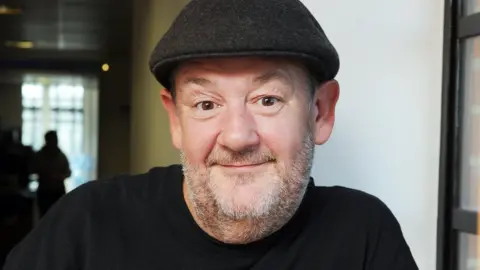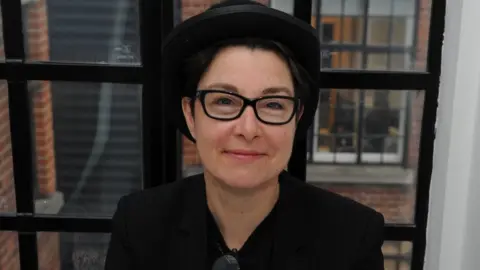Johnny Vegas: Comedian opens up about recent ADHD diagnosis
 BBC
BBCComedian and actor Johnny Vegas has revealed he has recently been diagnosed with attention deficit hyperactivity disorder (ADHD) at the age of 52.
The comic told BBC Breakfast that getting the diagnosis before Christmas "answers a lot of questions about behavioural issues in the past".
His comments came after presenter Sue Perkins recently disclosed that she had also received a similar diagnosis.
She wrote last week that "suddenly everything made sense" afterwards.
Vegas said he and Perkins have the same agent, who suggested he get assessed too.

"A lot of things make sense" now, Benidorm and Still Open All Hours star Vegas told Breakfast on Wednesday.
Asked what the condition meant for him, he said: "It's that sense of disorganisation and doing basic tasks. Everybody has an element of it - it's how strong your filter is, I think.
"When you don't have a filter at all, very simple things become very time consuming. It's like, [I'll say] I'll shift that cup, and then you have 10 other ideas and you haven't shifted that cup, and then three weeks later that cup's still there and somebody's like, why haven't you shifted that, and it's become this monumental task and it's built up.
"It's just, I suppose, how your brain organises itself. I always knew I was disorganised... but it [the diagnosis] helps make sense of a lot of things at school. I'm just on the verge of learning about it."
'No regrets'
He added that, in some ways, "it's made me who I am" and wondered whether "that chaos helped me be a better stand-up".
"In some respects you can go back and look at it with regret, but I've had a bit of a charmed life, so it's no regrets," he said. "I know now and it helps you make changes, I suppose, as you want to get more responsible later in life. I don't see it as defining me."
Other celebrities who have been diagnosed with ADHD in adulthood include presenters Ant McPartlin and Richard Bacon, comedian Rory Bremner and model Erin O'Connor.
Tony Lloyd, chief executive of the ADHD Foundation, told Breakfast that one in 20 people have the condition but it is "significantly under-identified and under-diagnosed in the UK".
"There's been a lot of stigma and enduring myths about ADHD," he said.
"There are many adults out there who have struggled for years with lots of different sort of characteristics of ADHD, but didn't think they had ADHD because they didn't identify with that enculturated belief that we were all given in school - that if you had ADHD, you were less intelligent, less able, badly behaved. And of course, that's all complete nonsense.
"So there are a lot of adults who, now that ADHD is much better understood, are beginning to realise that maybe a lot of the reasons that they've struggled were in fact ADHD. Many have been treated for years for things like anxiety and depression, and realise that actually, now they have a better understanding of what ADHD really is, perhaps that's the reason why."
ADHD in adults
- NHS England estimates that 3% of the population have ADHD
- It is characterised by three main features - inattention, hyperactivity and impulsivity but some people may have just one of these features or a combination of two rather than all three.
- Those are more extreme in people with ADHD than in others, and will have been so since childhood
- A GP can refer people to a specialist for an assessment
- Lifestyle changes to reduce stress factors can help people live successfully with ADHD
- Medication helps many adults too, but is not the only solution
